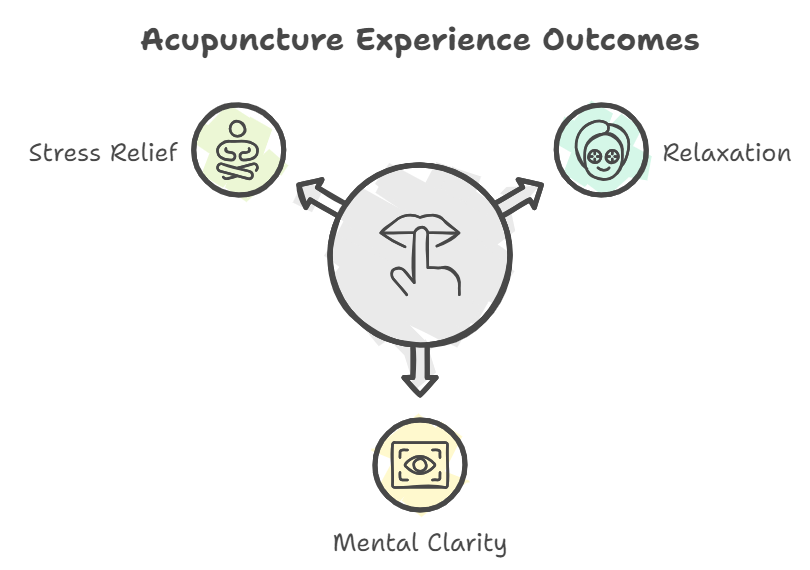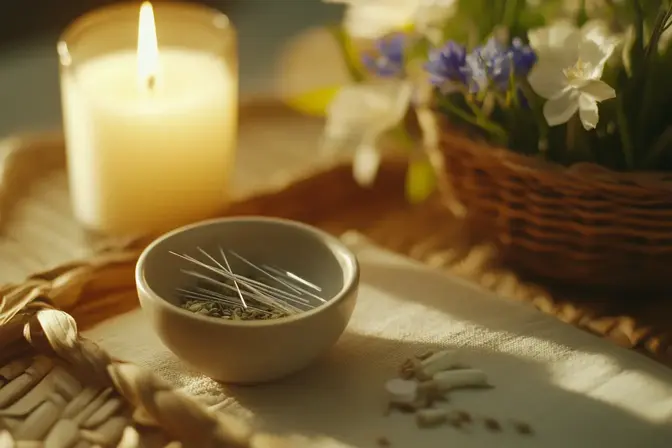Does the thought of another hectic day make your heart race? Is your mind buzzing with worries? You’re definitely not alone. Millions use acupuncture for stress and anxiety. But many don’t know how it works.
Let’s explore the link between tiny needles and inner calm.
Understanding Stress and Anxiety
Before we explore acupuncture for stress and anxiety, we must know their effects on our lives. These are genuine medical conditions that plague a large part of the population.
“Acupuncture taps into the body’s natural healing mechanisms, helping reduce stress and promote balance.”
Dr. John Doe
The Wide Reach of Anxiety Disorders
Anxiety disorders constitute a significant part of mental disorders. A 1994 study1 revealed their prevalence. It highlighted the harm of anxiety and stress on many people’s quality of life. Some common anxiety disorders include:
- Generalized Anxiety Disorder
- Panic Disorder
- Social Anxiety Disorder
- Separation Anxiety Disorder
The Physical Effects of Stress
We often associate stress with mental strain, but it can also manifest physically. Persistent tension, sleep disturbances, and chronic pain are common side effects of stress.
In more severe cases, individuals may even experience heart problems. So, it’s vital to treat anxiety. Methods like acupuncture can help.
How Acupuncture for Stress and Anxiety Works
Acupuncture is a key part of Traditional Chinese Medicine. It uses needles to relieve stress and anxiety. This practice is based on Qi (pronounced “chee”)2. It is a vital energy that flows through specific pathways in the body, called meridians.
These meridians act as invisible rivers of energy. Blockages in these pathways can cause various health issues, including pain, illness, anxiety, and stress. Feeling anxious is often a result of these blockages. Placing needles along these meridians helps. It removes blockages and restores the flow of Qi.
Acupuncture acupuncture for stress and anxiety treats both physical and mental symptoms. This includes panic disorder, phobias, and social anxiety disorder. Many people experiencing poor quality of life due to chronic stress and anxiety find relief through acupuncture.
It is essential to see how acupuncture can help with various anxieties, including social anxiety and phobias. For those interested in this method, it is best to learn acupuncture through certified courses. Also, get recommendations from qualified practitioners.
Where Science Meets Ancient Practice
Some may be skeptical. But, research suggests that stimulating acupuncture points releases endorphins. They are natural pain relievers and mood boosters. These endorphins play a crucial role in regulating the body’s response to pain and stress.
Acupuncture for stress and anxiety can potentially dampen the fight-or-flight response triggered by stress. Instead of feeling overwhelmed, you may experience a sense of relaxation and well-being.
Benefits of Acupuncture for Stress and Anxiety
Here are top 10 benefits of acupuncture. Promising evidence suggests that acupuncture can be a valuable tool for managing stress and anxiety. Acupuncture is often part of a holistic healthcare approach. It is used with other therapies or lifestyle changes.
As with any healthcare approach, consult your doctor—especially if you have preexisting conditions or take regular medications. This ensures that acupuncture for stress and anxiety is a safe and appropriate option for you.
If you’re exploring holistic wellness treatments, you might also be interested in weight loss spa therapies, which combine relaxation with targeted health benefits.
Beyond the Expected Benefits
Acupuncture may offer benefits beyond just reducing stress and anxiety. This holistic approach to well-being often leads to positive effects on other areas of health. Practitioners target specific acupuncture points to restore balance in the body’s energy systems3. This can greatly improve health and well-being.
However, visiting an acupuncturist regularly may not always be feasible due to time constraints or availability. Luckily, I recently stumbled upon a convenient alternative that mimics the effects of acupuncture for stress and anxiety. It’s a small device that you can use at home, and it has been a game-changer for me.
If you’re interested in experiencing the benefits of acupuncture without the need for regular appointments, you might want to check out this innovative solution called Aculief, that helps with migraines and relieves tension. It’s an easy way to integrate holistic healing into your daily routine.
What to Anticipate During Your Acupuncture Appointment: Tipps
Walking into an acupuncture clinic for the first time may spark curiosity or anxiety. But rest assured that it’s typically a relaxing experience.
Before the Needles Emerge
During your initial appointment, you’ll find yourself in a comfortable treatment room. The acupuncturist will talk to you. They will ask about your medical history, stressors, and health.
Think of it as providing context for them to understand the root cause of your anxieties.
Time for Treatment
You’ll be asked to relax in a comfortable position—on your back, stomach, or side, depending on the targeted points for acupuncture. These points are specific locations along the energy pathways we discussed earlier.
Once you’re comfortable, the acupuncturist will insert super-thin, sterile needles4 into these points. They are very thin. These needles are nothing like the ones used for injections.
After the Session
Most people feel incredibly relaxed after an acupuncture session. Some describe it as a post-workout bliss or a deep sense of calm.
This calming sensation can linger for hours or even days, helping to clear mental fog and promote a sense of tranquility. For many, this alone is reason enough to give acupuncture for stress and anxiety a try.

Is Acupuncture for Stress and Anxiety Right For Me?
Now, the question arises: Is acupuncture for stress and anxiety suitable for everyone? Many report acupuncture helps with stress and anxiety. But, results vary.
Like any form of treatment, some individuals respond better than others. A study in 2006 5 delved into this aspect, examining the effectiveness of acupuncture for depression.
Interestingly, other approaches like yoga also show promise in managing stress. If you’re exploring different ways to find relief, you might find our article on yoga for stress relief helpful.
Frequently Asked Questions
Is acupuncture good for stress and anxiety?
Anecdotal evidence suggests acupuncture may help with stress and anxiety. But, research on this is ongoing.
Many find that acupuncture relaxes them and reduces anxiety. But, it should be a complementary therapy, not a primary treatment.
How long does acupuncture take to work?
The time it takes for acupuncture for stress and anxiety to show noticeable effects varies depending on individual factors.
Anxiety severity, health, lifestyle, and the practitioner’s experience can affect treatment outcomes. Consistency is vital, and many sessions are often recommended for optimal results.
What is the 3-3-3 rule for anxiety?
The 3-3-3 rule is a simple grounding technique to regain control during moments of heightened anxiety or panic attacks. Here’s how it works:
Name 3 things you see around you.
Next, identify 3 sounds you hear.
Finally, move 3 parts of your body – your hands, fingers, or toes.
Repeating the 3-3-3 rule as needed can help shift your focus away from anxious thoughts and reconnect you with your surroundings.
Conclusion
If you’re seeking the right approach for your wellness, acupuncture for stress and anxiety might be worth exploring. It can potentially provide relief from those overwhelming feelings and anxieties.
By tapping into the body’s natural energy pathways, it helps to restore balance, reduce tension, and promote a deep sense of calm. For those struggling with the overwhelming effects of modern life, this ancient practice offers a holistic approach that aligns with the body’s own healing mechanisms.
Exploring acupuncture for stress and anxiety is a worthwhile endeavor, especially if you’re seeking a natural alternative. Your health and well-being deserve thoughtful and proactive care.
Take the first step by researching, consulting with professionals, and most importantly, listening to your body. The path to peace of mind and better health might be closer than you think.
Small Step, Big Impact
Consider incorporating a regular acupuncture routine or consulting with a certified practitioner as a proactive approach to managing stress.
Listen to this article
This is an AI generated Podcast version of the article.
- https://pubmed.ncbi.nlm.nih.gov/8279933/[↩]
- https://instyledecoparis.com/what-is-chi-or-qi-energy/[↩]
- https://my.clevelandclinic.org/health/treatments/4767-acupuncture[↩]
- https://www.sciencedirect.com/topics/nursing-and-health-professions/acupuncture-needle[↩]
- https://www.psychiatrist.com/wp-content/uploads/2021/02/10413_acupuncture-depression-randomized-controlled-trial.pdf[↩]



